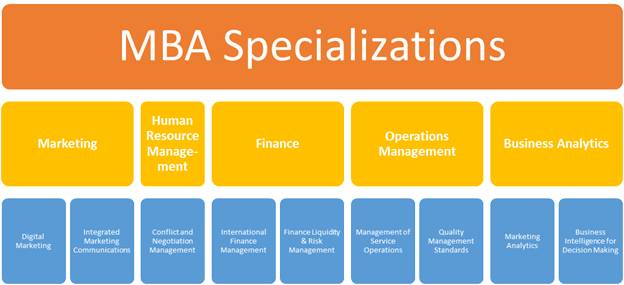There’s an oft-repeated remark that there are a multitude of graduates for a single job profile in India. Employment prospects remain bleak in these current times, with the news regularly featuring students unable to repay educational loans. This inevitably prompts the question – can an MBA guarantee a high-paying job?
The answer is a resounding yes! Always. Read on to comprehend the finer details:
Understanding the How’s and the Why’s

Business programmes hold their significance as, globally, an MBA is recognised as the premier contender in the job market. This is due to the fact that MBA students have consistently proven their capability to innovate and explore.
The value of MBA lies in the qualities the degree program nurtures in its students. Growth and risk-taking are two vital abilities inherent in an MBA, invaluable both for their present and future. These traits make businesses value MBA graduates and their passion.
Full-time MBA programmes across India remain fiercely competitive, with business schools receiving, on average, a staggering 40 applications per single seat. An impressive 73 percent of graduate business programmes report increased application volumes, clearly indicating the trend towards an MBA.
An MBA imbues a person with qualities that make them appealing to employers, including time management, soft skills, market insights, and a willingness for risk-taking. The benefits of an MBA programme include that it is designed to adapt to the dynamic economic environment with its multidisciplinary approach towards business and people management.
MBAs are often digitally savvy, understanding consumer expectations and improving the post-purchase experience. When combined with networking opportunities, this results in a harmonious blend of customer satisfaction and relationship building, strengthening the employer’s preference.
Equipped with an entrepreneurial mindset, instilled through numerous project assignments, many MBAs forge a new path for themselves as job creators and work towards goals such as sustainability and social ethics.
Top 5 MBA Specializations

1. Marketing
Marketing remains one of the most popular MBA specialisations due to the dynamic nature of the field. It requires a strong understanding of the consumer mindset and market trends, making it an exciting choice for many MBA aspirants.
Digital Marketing: An integral part of modern marketing, digital marketing uses online channels and digital technologies to promote a product or service. An MBA specialisation in this area equips students with the knowledge of search engine optimisation (SEO), social media marketing, email marketing, and mobile marketing among others, and how these can be used to achieve business objectives.
Integrated Marketing Communications: This area focuses on ensuring consistency in a company’s promotional messages across various channels, including advertising, public relations, direct marketing and social media. An MBA in Integrated Marketing Communications would teach students how to develop and execute effective communication strategies that resonate with target audiences.
2. Human Resource Management
Human Resource Management (HRM) is about managing an organisation’s most valuable asset – its people. This specialization focuses on the recruitment, management, and direction of the people who work in an organization.
Human Resource Management: The primary role of HRM is to maximise employee productivity and protect the company from any issues that may arise from its workforce. MBA students specialising in HRM are taught how to manage people in a work environment and create a conducive atmosphere for them to work.
Conflict and Negotiation Management: This sub-speciality prepares students to handle disputes in the workplace and to negotiate effectively. They learn how to mediate between conflicting parties and help them reach a mutual agreement.
3. Finance
Finance is a popular MBA specialisation and covers various aspects related to managing and allocating funds.
International Finance Management: As businesses continue to globalise, understanding international finance has become crucial. This specialisation covers topics such as foreign exchange risk, international investment decisions, and managing multinational businesses.
Finance Liquidity & Risk Management: This area is concerned with how an organization manages its financial risks and ensures it has enough liquidity to meet its obligations. Students learn about credit risk, liquidity risk, market risk and operational risk, and how to mitigate them.
4. Operations Management
Operations management involves designing and managing the process of production and redesigning business operations.
Management of Service Operations: This specialisation teaches students how to manage the delivery of services, which has its unique challenges compared to the production of goods. They learn about managing capacity, quality, and the customer experience.
Quality Management Standards: This area focuses on understanding and implementing quality management standards like ISO 9000, Lean Six Sigma, and Total Quality Management (TQM). It equips students with the skills to enhance the quality of processes and output.
5. Business Analytics
Business Analytics is about using data and statistical methods to make informed business decisions.
Marketing Analytics: This specialisation is about applying data analytics to make marketing decisions. It includes analysing customer behaviour, market segmentation and targeting, and predicting future trends.
Business Intelligence for Decision Making: This focuses on using data and business intelligence tools to inform strategic decision making. Students learn about data warehousing, data mining, and how to create dashboards and reports for decision making.
Each of these MBA specialisations offers unique opportunities and potential career paths, and students should choose the one that aligns best with their career goals and interests.
The International Aspect

MBA programmes in countries like Europe and Canada are experiencing growth at twice the rates of other nations. However, in the U.S.A., only 32 percent of the programmes report growth in terms of international applications. Similarly, two-thirds of United Kingdom programmes have seen positive growth trends, a number just slightly below the 77% figure of the Canadian programmes.
Among these applications, women make up 42 percent of the total applicants, a number which has seen a gradual increase over time. The Economist reported that the number of MBA degree holders in the USA has increased sevenfold since 1970. Business school trends can be intimidating, leading to students often ending up selecting a school that barely aligns with their life and learning goals.
The prestige of the business school and its brand equity is crucial for attracting employers, but it’s personal enthusiasm and passion that showcases your commitment to the work and influences selection outcomes.
Some people opt to study an MBA due to the global career progression it promises, while others hope to adjust their salary structure through this career trajectory. A few take the giant leap of faith, changing sectors and geography in one bold move.
For an MBA programme, collaboration is the key to success. Every business school and its students need to connect with local organisations and developments to understand their perspectives. Resources dedicated to student development and activities designed to enhance the same ensure MBA students gain the best exposure during the course and are well-prepared during the internship phase.
Many business schools invite top executives for roundtables, speaker sessions or meetings to broaden the learning horizons. A business school’s success and the value of MBA programme it offers are tied to the business opportunities it can provide for its students, prompting all to strive to produce the next top CEO.
Highlighting the Positive Trends

The average take-home salaries of MBA graduates are believed to have increased significantly, having been at their highest in the past decade following three years of experience in the workplace.
The financial services and e-commerce sectors were the highest paying sectors for MBA graduates. Furthermore, sectors and companies not traditionally associated with hiring from these business schools are now actively seeking candidates with an MBA qualification.
An MBA is akin to a marathon, requiring both commitment and hard work over a two-year period of study. Firm belief is necessary to achieve the desired outcome.
The course is also viewed as a generalist degree for those specialising in a specific trade. As one progresses through the course, technical skills are gained, and the opportunity to become a mid-level or even senior-level manager opens up.
The benefits of an MBA programme also lie in the fact that it provides insights into local partnerships, FDI policies, and shareholder value. An MBA not only offers a formal education in business but is also a self-improvement initiative in marketing, human resource, finance, and operational functions.
An MBA provides practical exposure to erase geographical business boundaries. Companies are already recognising the benefits of globalisation, pooling resources such as raw materials, capital, and human capital. After witnessing the aftermath of the 2008 recession and the collapse of the Indian markets, an increasing number of MBA schools are creating opportunities that prepare candidates to work in an international landscape.
Today’s MBA is a person who can identify market needs and collaborate with investors, technical teams, and sales personnel to deliver the right product. It is indeed vital to create business outcomes that will assure employment for people and empower them to earn a living.
An MBA can deliver better results by delving into key business functions such as strategy, finance, and operations, and learning how to lead the change process. Therefore, when considering an MBA, you can be seen as a part of the driving force behind business success. According to an FT report, MBA salaries have increased to reach an average of $142,000 in 2017, with a growth rate of 12%.
The report also forecasts the data analysis for the upcoming year to be positive, indicating that salaries are on an upward trend. Furthermore, average salaries have increased by a whopping $7,000 in 2017, the largest increase in the past 12 years.
All sectors, excluding education, logistics, and law, saw an increase in average salaries. If this trend continues, the overall average salary boost is expected to reach $150,000 in 2018 according to international standards.
Another positive trend related to MBA graduates is that these professionals have consistently doubled their salaries within three short years of completing their degree. Therefore, choosing a university or MBA college is a critical decision for future success.
Alongside accreditations, the faculty, placements, and academic welfare of students should also play a significant role in choosing an MBA college.
Conclusion
MBA programmes are taught with specialisations that accommodate industry needs. These programmes have become instrumental in imparting necessary skill sets to students.
The degree is a structured attempt to develop students’ professional attributes through projects and assignments. However, many students fail to utilise the impressive resources available on the business school campus and fail to explore them. Such resources can provide knowledge on how to enjoy the college experience as much as possible.
Moreover, the MBA never goes out of style. Its capability and value continue to rise every year due to the degree’s ability to reinvent itself to meet industry needs.





